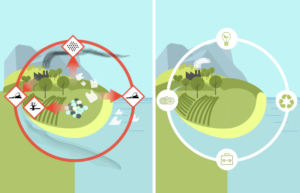On 25 June the Environment Council adopted conclusions on delivering the EU action plan for the circular economy. The Council reconfirmed the potential of the circular economy to achieve sustainable growth and to reduce the dependency of the EU on non-renewable primary raw materials, in particular through an increased recycling of plastic products. It underlined the need to reconsider consumption habits and to avoid unnecessary use of plastic. It stressed that all stakeholders have the responsibility to take the necessary action for change, regarding the design, use and consumption of products. It also underlined the importance of the sound management of substances of concern in products and waste for setting up non-toxic material cycles.
The circular economy is the greatest achievement of our time. I am very pleased that today ministers agreed on common actions to implement the EU action plan on the circular economy. We all need to reconsider how we use and consume plastic. Neno Dimov, the Bulgarian Minister for Environment and Water

The EU is working on new rules to improve access to water for all, upgrade drinking water standards and increase transparency
Drinking water
Environment ministers held a live streamed policy debate on the drinking water directive which is a direct result of the first ever successful European citizens’ initiative. The drinking water directive improves water quality standards, introduces a risk-based approach to the monitoring of water, and harmonises the information available on water quality as well as services to consumers.
CO2 standards for cars and vans
In the afternoon, the Council held a live streamed policy debate on the regulation on CO2 emission standards for cars and vans. Ministers discussed the proposed CO2 emissions reduction targets of 15% from 2025 and 30% from 2030 for new cars and vans. Ministers also analysed the proposed incentive mechanism for zero- and low-emission vehicles.
Other topics on the agenda
In a public session, the Council had the opportunity to hear a presentation by the Commission on its new legislative proposals on CO2 standards for heavy-duty vehicles, LIFE, water reuse, single use plastics and on the alignment of environmental reporting obligations. The Commission also reported on the EU pollinators initiative which sets out to protect honeybees, wild bees and wild insect pollinators which are threatened with extinction.

















